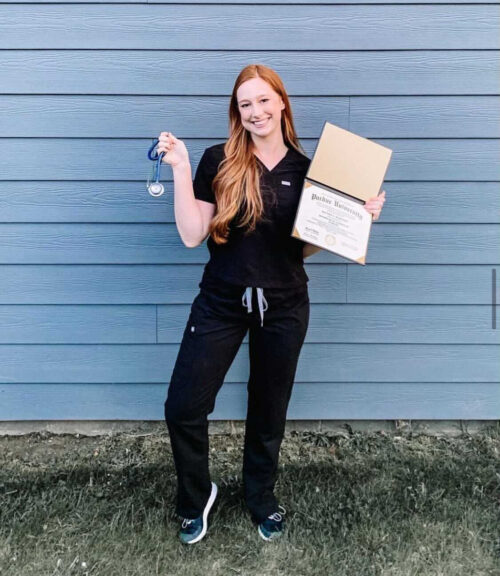‘Marathon of crisis’: Nurses’ mental health in forefront of new study
By Tim Brouk, tbrouk@purdue.edu

Karen Foli
A new Purdue University College of Health and Human Sciences study reveals the stress, psychological trauma and, at times, system failures, that occurred in healthcare facilities during the COVID-19 pandemic as reported by the frontline critical-care nurses themselves.
The research project, “Nurses’ Psychological Trauma and Cognitive Control in the COVID-19 Pandemic,” surveyed more than 100 nurses around the United States and Canada, including several Purdue School of Nursing alumni. The questionnaire covered vital mental health topics such as depression, anxiety, PTSD, and drug and alcohol use during the height of the pandemic.
“Nurses have gone through incredible psychological distress and trauma,” said Karen Foli, associate professor of nursing and co-principal investigator on the project with Department of Psychological Sciences assistant professor Yu-Chin Chiu. “They’re not soldiers; they are professional nurses who were put in extraordinary situations that sometimes overwhelmed them on a chronic basis.”

Yu-Chin Chiu
Funded by the College of Health and Human Sciences’ Rapid Response Grant program, the research results were published in the Journal of Advanced Nursing. A second paper from this study will concentrate on nurses’ ability to complete cognitive control tasks after experiencing COVID-19-related trauma. This study is still ongoing. Lingsong Zhang, associate professor in the Department of Statistics and Regenstrief Center for Healthcare Engineering, is also a co-investigator on this research.
Foli paid particular attention to the responses to a pair of open-ended questions in the survey. Not all nurses responded but more than 70 participants filled out at least one, which allowed them to pour out their experiences during their shifts and at home.
“They talked about this tsunami of death, just this wave upon wave,” Foli said. “Often the patients would die alone or only with the nurse at the bedside, and that was a major contributor to secondary traumatic stress on the nurse.”
The qualitative data “puts muscle on the bones” of the quantitative data collected by Foli and Chiu. The narratives and themes reveal what can be done to improve the mental health of these vital nurses as well as the care of patients during the next pandemic. One nurse’s long response inspired Foli to call nurses’ experiences during the pandemic a “marathon of crisis.”
Foli shared some of this unidentified nurse’s response: “The hospital did not have enough critical care-trained nurses to care for the amount of patients we were seeing. I agreed to help, despite the fact that I had a 6-month-old baby at home. My very first shift at the sister hospital, I had three intubated, sedated, paralyzed, prone, unstable patients.”
“The nurses were concerned about getting their family sick,” Foli said. “They would isolate themselves, which would compound what they were experiencing. Their peers also began to provide less support, further exacerbating the trauma they were experiencing.”
One recurring problem reported by the nurses was the shortage of personal protective equipment (PPE) at the beginning of the pandemic. This unfortunate phenomenon made headlines, but Foli said it was an issue before the first COVID-19 cases began rolling in. She coined the phrase “insufficient resource trauma” in a paper published pre-pandemic in the Archives of Psychiatric Nursing (Foli, Reddick, Zhang, & Krcelich, 2020).
The nurses in the study reported another grave issue surrounding insufficient resources: lack of staffing. Foli said due to many hospitals losing money during the pandemic — a decrease in elective surgeries, for example — nursing corps are being short-staffed. Anecdotal reports in daily professional newsletters describe open positions not being filled or departments in need of more nurses being denied.
“That’s the worst thing they could do,” Foli said. “If true, it’s a very uninformed, bad call in my opinion. … Nurses are seen as a cost instead of an income generator. I think if they are going to be short-sighted about nurse-staffing, they need to realize that nurses aren’t going to be able to render the quality care patients need.”
Nurses weren’t the only health workers to experience trauma during the pandemic. Doctors, EMTs and other staff all experienced the brunt of the historic event, but Foli said nurses had especially trying times because they were at the bedside 24/7.
“Those folks who think the pandemic is over, they have to understand what nurses went through,” Foli said. “We need to give them resources in the form of mental health support, not just in the short term, and we need make sure it’s accessible and trauma-informed.”
With Foli and Chiu’s research, other research, and the American Nurses Association Enterprise COVID-19 Well-Being Initiative, there is growing awareness of the mental health and well-being of nurses. The work could help bolster the ranks of the nursing corps, too. According to a May 2021 McKinsey Global Institute study, 22% of nurses polled said they are thinking of leaving their current position. These initiatives could encourage nurses to stay in their profession.
Hannah McKinney’s (NUR ‘20) career has been parallel with the pandemic. At Eskenazi Hospital in downtown Indianapolis, she was a student tech in March 2020 when the first COVID-19 patients began trickling in. She was hired immediately after her May graduation as a nurse in the ER trauma unit. By then, the COVID-19 patients far exceeded the patients who needed lifesaving treatments from crashes, shootings or stabbings.

Hannah McKinney (NUR ’20) has treated COVID-19 patients for her entire young career so far.Photo provided
McKinney said she still suffers from the trauma she experienced during her first few months at Eskenazi. The patient deaths, the unknown variables of the new coronavirus and the often-changing guidelines from the Centers for Disease Control and Prevention weighed heavily on the young nurse and her colleagues. A near breaking point occurred when PPE namely N95 masks, became scarce for her and her fellow nurses. They had to make their lone N95 mask last for a month at least.
“That’s when it stated to feel almost apocalyptic. Are we being led to our deaths basically?” McKinney remembered. “It got to the point where I stopped going to the grocery store because I would have a really hard time whenever I saw a person wearing an N95, thinking I’m not allowed. I’m going into situations where I could get sick because I wasn’t allowed access to a new N95. It just felt very isolating and lonely.”
McKinney reports that conditions are better now than they were the first few months of the pandemic. Much more is now known as she has started to assist in intubating patients again during the delta variant surge. However, reading about experiences from fellow nurses across the country on social media has helped her mental well-being. She knows she is not alone and there is help out there for her and her colleagues.

Kaley Butler credits her colleagues for helping her persevere as an ICU COVID-19 nurse in Mishawaka, Indiana.Photo provided
“COVID is still so defeating,” McKinney said. “But every time I would see a post on Facebook or something from another nurse’s perspective, to see my experiences expressed by someone else so that others can hear it, I think that’s so impactful and so helpful.”
Kaley Butler (NUR ’20) was hired at an ICU in Mishawaka, just a few months before COVID-19 terrorized northeast Indiana. Like McKinney, she suffered mentally and physically in 2020 due to the overwhelming number of patients, lack of PPE, understaffing and emotions of family members not being able to see their sick loved ones. She credits her colleagues as the reason she returns to work every shift. Support from fellow nurses helps Butler to soldier through as they now battle the COVID-19 delta variant.
“My mindset during the delta variant is to just keep pushing to get through it. I try to look at the positives — like how we know more about how to treat the virus,” Butler said. “Keeping that in mind along with knowing that my coworkers have my back is what keeps me going back to work.”
Discover more from News | College of Health and Human Sciences
Subscribe to get the latest posts to your email.